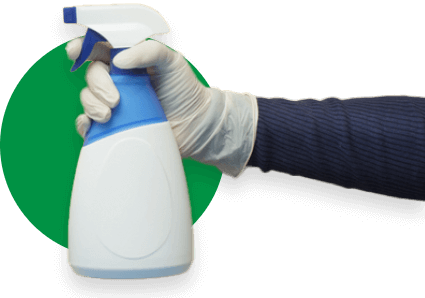Knowing the janitorial cost per square foot in Dallas helps you budget with confidence. Rates vary by building size, layout, and cleaning frequency. Add-ons can raise expenses if you don’t plan.
This guide explains typical DFW pricing and offers practical ways to save money.
Why Understanding Janitorial Costs Matters
Keeping your office clean is vital to employee health, productivity, and first impressions. Studies show that a tidy workplace leads to higher perceived productivity and satisfaction among staff. Clean environments also reduce allergies and respiratory problems, resulting in fewer sick days.
In Dallas’s competitive business environment, a sparkling office communicates professionalism and can influence client perceptions. Yet, many business owners underestimate cleaning costs or fail to budget correctly. Understanding how janitorial costs per square foot are determined helps you plan accurately and identify cost-effective strategies.
What Is Janitorial Cleaning?
Janitorial cleaning refers to the ongoing maintenance services that keep commercial spaces clean, tidy, and sanitary. Unlike deep cleaning (a one‑off, intensive service), janitorial cleaning happens regularly and includes essential tasks:
- Surface maintenance: Dusting, wiping, and sanitizing high‑touch areas
- Floor care: Sweeping, mopping, and vacuuming all floor surfaces
- Waste management: Emptying trash bins and replacing liners
- Restroom maintenance: Cleaning, disinfecting, and restocking facilities
- Kitchen upkeep: Cleaning appliances, sinks, and food preparation areas
These services maintain day-to-day cleanliness and ensure compliance with health regulations.

Pricing Methods: Square Foot vs. Hourly vs. Flat Rate
Janitorial services are charged in one of three ways:
Per square foot – common for larger facilities, with rates ranging from $0.08–$0.16 per sq ft in Dallas and nationally from $0.08–$0.25. The bigger the building, the lower the rate due to economies of scale.
Per hour – often $25–$90 per hour, depending on region, labor cost, and specialty requirements; lower for routine offices, higher for medical/industrial spaces.
Flat rate – quoted after a walkthrough, based on footage and expected labor; predictable, but may be higher if more time is required.
Which is “best” depends on your priorities. Always compare quotes and clarify inclusions to avoid surprises. These three pricing approaches each serve different business needs and priorities.
Pricing Method Comparison
| Method | Best For | Pros | Cons |
| Per Square Foot | Large facilities, consistent layouts | Transparent pricing, easy to budget | May not account for complex areas |
| Hourly Rate | Variable cleaning needs, small offices | Flexible for changing requirements | Harder to predict monthly costs |
| Flat Rate | Predictable monthly budgets | Fixed costs, no surprises | May be higher if actual time varies |
Average Janitorial Costs by Square Foot in Dallas
Dallas Janitorial Services offers a calculator that estimates costs using a $0.11 per‑sq‑ft base rate. Typical three‑times‑per‑week office scenarios in DFW:
| Square Footage | Estimated Cost | Hours Needed |
| 0–1 000 sq ft | $200–$400 | ~1 hour |
| 1 000–5 000 sq ft | $400–$550 | 1–2 hours |
| 5 000–10 000 sq ft | $575–$675 | 2–3 hours |
| 10 000–20 000 sq ft | $700–$1 150 | 3–5 hours |
| 20 000–40 000 sq ft | $1 250–$1 650 | 5–9 hours |
These figures are guidelines; actual prices vary with building layout, industry, and frequency.
National Comparisons
For context, national averages from industry sources place commercial cleaning at $0.08–$0.25 per sq ft and $25–$90 per hour, with averages around $39/hr. Profit‑focused guides emphasize accounting for labor, supplies, and overhead (e.g., $0.12 + $0.02 + $0.01) before margins.
Factors That Influence Janitorial Costs
Multiple variables affect your final bill:
Office Size and Layout
Larger spaces require more time and supplies. Open floor plans cost less per square foot than cubicle‑heavy offices with many desks and rooms. High ceilings and complex architecture also increase costs.
Cleaning Frequency
Regular cleaning reduces per‑visit costs because dirt and debris don’t build up. For most offices, daily cleaning or two to three times per week is typical.
Facility Type
Medical facilities, restaurants, and industrial buildings require stricter protocols, which raise costs. For example, restaurants may run $0.15–$0.30 per square foot. Industrial facilities can reach $0.35 per square foot.
Number of Restrooms and Kitchens
Bathrooms and kitchens demand extra attention and specialized products. Window density also matters because cleaning interior and exterior glass takes additional time.
Type of Cleaning
Basic janitorial services include sweeping, mopping, vacuuming, dusting, wiping, trash removal, and restroom/kitchen care. Deep cleaning, floor waxing, carpet extraction, and floor buffing are billed separately.
Location and Labor Costs
Urban centers generally have higher labor costs than suburban or rural areas. Travel time, parking fees, and local wages all influence pricing.
Occupancy and Traffic
The more people using the space, the more frequent cleaning you’ll need. High‑traffic areas like lobbies, elevators, and bathrooms need more frequent disinfection.
Understanding these variables helps you evaluate quotes more accurately and avoid unexpected charges.
Add‑On Services and Their Costs
Some tasks fall outside of standard janitorial packages and incur extra charges. Dallas Janitorial Services lists typical add‑on costs:
- Kitchen appliance cleaning: $10–$37 per appliance.
- Floor stripping and waxing: $0.29–$0.47 per sq ft.
- Tile floor scrubbing: $0.12–$0.22 per sq ft.
- Carpet shampooing & extraction: $0.08–$0.20 per sq ft.
- Window cleaning: $4–$8 per window or $0.50–$2.50 per sq ft.
- Disinfecting services: $10–$30 per room; specialized disinfecting may cost $0.10–$0.20 per sq ft.
Learn more about our disinfecting services for transparent pricing and professional protocols. Planning for these additional services prevents budget surprises and ensures comprehensive cleaning.
Janitorial Cost Calculator: How to Estimate Your Price
To estimate your janitorial cost per square foot, follow this formula:
Square Feet × Base Rate × Hours Needed = Cost
Then: measure your space, select a base rate (e.g., $0.11 for standard Dallas offices), estimate crew speed (often 3,000–4,000 sq ft/hr), add any add‑on services, and multiply by frequency to reach monthly totals.
For example, a 5,000 sq ft office cleaned three times per week at $0.11 ≈ $165 per visit. If you add carpet extraction at $0.10 per sq ft, that’s $500 per service.
Cost‑Saving Strategies Without Sacrificing Quality
Cleaning costs can add up, but there are ways to manage them:
- Use efficient technology to reduce labor time: Invest in high-efficiency vacuums, microfiber cloths, and automated dispensers that speed up cleaning tasks.
- Train employees to reduce clutter and spills: Encourage staff to maintain organized workspaces, clean up spills immediately, and follow basic cleanliness protocols.
- Manage staffing with clear schedules and scopes: Create detailed cleaning checklists and establish accountability measures to prevent duplication of effort.
- Declutter regularly to cut time spent moving items: Implement monthly organization drives and provide adequate storage solutions for employee belongings.
- Buy in bulk to lower per‑unit costs: Purchase cleaning supplies, paper products, and sanitizers in larger quantities to achieve volume discounts.
- Bundle services for volume discounts: Combine tasks like floor care, carpet cleaning, and window washing with the same provider for reduced rates.
- Schedule strategically: Consider daytime cleaning during business hours, which may cost less than after-hours service due to reduced overtime labor rates.
- Outsource strategically: Hiring a professional janitorial company ensures consistency, proper sanitization, and accountability; experts use professional equipment and have insurance to cover accidents, which protects your business from liability claims and worker compensation issues.
Implementing these strategies can reduce your cleaning costs by 15-30% while maintaining quality standards and ensuring regulatory compliance.
Health, Productivity, and Return on Investment
Spending on cleaning and indoor air quality is an investment in your workforce. The CDC states that “Cleaning with commercial cleaners that contain soap or detergent decreases the number of germs on surfaces and reduces risk of infection”.
For air quality, the EPA confirms that “When used properly, air cleaners and HVAC filters can help reduce airborne contaminants, including viruses”. Research published in Environmental Health Perspectives showed that “cognitive scores were 61% higher on the Green day and 101% higher on the two Green+ days” when comparing clean versus polluted environments. Together, these effects support fewer absences and better focus, which can outweigh the cost of routine cleaning.
How to Choose the Right Janitorial Company
Selecting a competent cleaning partner is crucial. When evaluating potential cleaning partners, focus on these essential criteria:
- Experience and specialization: Look for companies with experience in your industry (office, healthcare, industrial, etc.).
- Licenses and insurance: Ensure the provider is licensed, bonded, and carries liability insurance and workers’ compensation.
- Certifications: Check for certifications like ISSA CIMS; verify OSHA compliance or EPA registration for disinfecting products.
- Eco‑friendly practices: Ask whether they use environmentally friendly cleaners and recycling programs.
- Customized plans: Choose a provider that offers tailored cleaning plans; ask if core services are included or if add‑on tasks like carpet extraction or high‑dusting cost extra.
- Transparent pricing: Request a detailed quote that lists rates, scope, supplies, and add‑on costs. Avoid vague or unusually low estimates.
- Employee screening: Ask about background checks and training. Low turnover often correlates with consistent service quality.
- References and reviews: Read reviews and ask for references from clients in your industry.
- Satisfaction guarantee: A reputable company will rectify issues promptly and ensure you’re happy with the service.
- Trial period: Some companies offer a trial period or short‑term contracts. Use this to assess reliability and quality.
Work with Commercial Cleaning and Janitorial Service Experts Today
Understanding the janitorial cost per square foot helps you budget realistically and avoid unexpected charges. By comparing local rates, calculating your own expenses, and following cost‑saving tips, you can keep your Dallas workspace spotless without overspending.
Ready to create a tailored cleaning plan? Contact Dallas Janitorial Services for a complimentary quote and discover how our professional team can efficiently and affordably maintain your office.

Frequently Asked Questions
What is the average janitorial cost per square foot in Dallas?
About $0.11 on average, with a common range of $0.08–$0.16; exact pricing depends on size, layout, and frequency.
How much does janitorial cleaning cost per hour?
Typically $25–$90 per hour, with a national average around $39/hour.
What factors most affect janitorial pricing?
Square footage, layout, frequency, facility type, number of restrooms/kitchens, type of cleaning, location/labor, and traffic.
How often should my office be cleaned?
Small offices may schedule once or twice weekly; most offices need daily or two to three times per week. High‑traffic areas may need more frequent sanitization.
What services are included in janitorial cleaning?
Standard tasks (sweeping, mopping, vacuuming, dusting, wiping, trash removal, restrooms/kitchens). Deep cleaning and specialty services are add‑ons.
How can I reduce janitorial costs without sacrificing quality?
Use efficient tools, train staff, declutter, buy in bulk, bundle services, and hire professionals for consistency and compliance.
How do I choose the right janitorial company?
See the checklist above for experience, certifications, insurance, eco‑practices, customization, pricing transparency, and reviews.
Why hire professionals instead of DIY?
Pros bring proven processes, commercial‑grade equipment, and insurance, helping prevent lapses that lead to health risks and higher long‑term costs.







